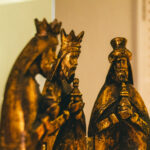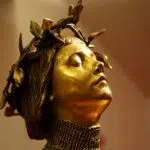For those who thought that Christmas was over, Epiphany, celebrated on January 6, marks the final celebratory day of the Christian holiday season! While most people begin taking down their Christmas decorations by New Year’s, there is still a full week before many practicing Christians complete their celebrations of the birth of Jesus Christ. It is commonly associated with the day the Three Wise Men arrived at the manger and has several different names throughout history and cultures.
History of Epiphany
Epiphany is a Christian feast day celebrating the revelation of God incarnate as Jesus Christ. In Western Christianity, the feast commemorates the visit of the Three Wise Men who followed an angel to Bethlehem where Jesus was born. The day has also been referred to as Three Kings Day and Little Christmas by both Irish and Amish Christians. The Feast of the Epiphany concludes the twelve days of Christmastide and is the traditional end of the Christmas season. As early as the fourth century, churches of the Eastern Roman Empire were celebrating Christmas on January 6. Those in the West were celebrating on December 25, which is why some places refer to the Feast of the Epiphany as Old Christmas. Since then, many cultures have developed their own names and traditions to celebrate this day. For example, in Scandinavia, they celebrate what they call Little Christmas Eve on December 23. In Spain, children traditionally did not receive their presents on Christmas Day but instead on January 6, in commemoration of the day the Wise Men arrived in Bethlehem bearing gifts of gold, frankincense, and myrrh. In Ireland, they also call Little Christmas Women’s Christmas, because Irish men take on the household duties for the day. Other popular traditions include singing, chalking the door, having one’s house blessed, eating a three kings cake, going to church, and winter swimming. It is also customary for many Christians to remove their Christmas decorations on Epiphany Eve, although other Christian countries historically remove them on Candlemas, the conclusion of the Epiphanytide. According to the first tradition, those who fail to remember to remove their Christmas decorations on Epiphany Eve must leave them untouched until Candlemas.
Epiphany timeline
Based on historical findings, and biblical references, most scholars believe Jesus was born between 4- and 6 B.C.
The earliest reference to Epiphany as a Christan Feast is by Ammianus Marcellinus, who assigns January 6 to both Jesus’ birth and baptism.
The pilgrim, Egeria, describes a celebration in Jerusalem and Bethlehem that she calls ‘Epiphany’ to commemorate the Nativity.
Johann Sebastian Bach composes two cantatas for the feast that concludes Christmastide.
After revising the General Roman Calendar, the Feast of the Epiphany is made a part of Christmastime.
Epiphany FAQs
Why is Epiphany on January 6?
Also known as ‘Old Christmas’, January 6 is often recognized as the 12th day of Christmas, concluding the Christian holiday season and commemorating the arrival of the Three Wise Men.
What does the day of the Epiphany mean?
The day of the Epiphany is a Christian feast day celebrating the revelation of the incarnation of God as Jesus Christ.
Why is Epiphany 12 days after Christmas?
The 12 days is a symbolic representation of the amount of time it took the Three Wise Men to travel to Bethlehem to recognize Jesus as the son of God.
HOW TO CELEBRATE EPIPHANY
-
Go caroling
Yes, caroling is still permitted after Christmas Day and there are plenty of songs for you to sing your heart out.
-
Give gifts
Many cultures still give gifts on Little Christmas in honor of the Three Wise Men who visited Baby Jesus, follow in their traditions and do the same.
-
Take down your lights
Many Christians celebrate the Feast of the Epiphany as the concluding holiday of the Christmas season and traditionally remove their decorations on this day.
5 FUN FACTS ABOUT EPIPHANY
-
Where it’s from
The word ‘epiphany’ comes from the Greek word ‘epiphainein’, which means ‘to make known’, ‘to manifest’, or ‘to shine upon’.
-
The three astrologers
It’s believed that the Wise Men were less like kings and more like astrologers — the word ‘magi’ is derived from ‘magus’, an Old Persian priestly caste that paid particular attention to the stars.
-
The rule of threes
The Bible never mentions how many wise men there were, it simply said there were ‘wise men from the east’. Most have assumed the number three based on the three gift offerings of gold, frankincense, and myrrh.
-
Filling in the blanks
While their names were not originally mentioned, later tellings of the story identify the Magi by name and places of origin: Melchior from Persia, Caspar from India, and Balthazar from Arabia.
-
Three men and one gospel
Matthew is the only one of the four canonical gospels to mention the Magi.
Why Epiphany is Important
-
It is one of the oldest Christian holidays
Often referred to as ‘Old Christmas’, Eastern Christianity originally celebrated Christmas on January 6.
-
It extends the holidays
Who doesn’t love a little more eggnog, TV specials, and holiday cheer?
-
Giving and Receiving Gifts
It’s not just about receiving gifts, but it’s another great excuse to experience the joy of giving someone one, too.
Epiphany dates
| Year | Date | Day |
|---|---|---|
| 2023 | January 6 | Friday |
| 2024 | January 6 | Saturday |
| 2025 | January 6 | Monday |
| 2026 | January 6 | Tuesday |
| 2027 | January 6 | Wednesday |































